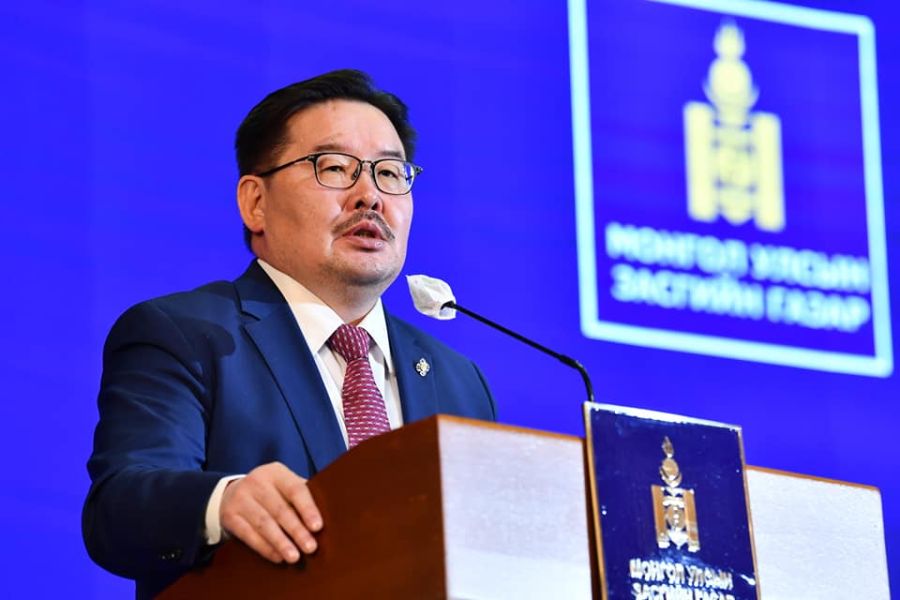Economy and corruption challenge face Mongolia's new prime minister Zandanshatar
Gomboja Zandanshatar was elected after the resignation of Oyun-Erdene, who was ousted following strong youth protests in Ulan Bator. A former banker who studied in Russia and did research at Stanford, he will face serious economic challenges, including inflation, deficit and unemployment. ‘Budget review inevitable,’ he said. Tax reforms and restrictions on luxury consumption and high incomes have been announced.
Rome (AsiaNews/Agencies) - Gomboja Zandanshatar, 55, a former banker trained in Russia, is Mongolia's new prime minister. He has already held various institutional positions, including foreign minister, head of the cabinet secretariat and president of the State Great Khural, the Mongolian parliament.
MPs elected him after the resignation on 3 June of his predecessor, Luvsannamsrain Oyun-Erdene, 44, who was ousted by parliament after being crushed by weeks of youth protests in Ulan Bator.
The demonstrations focused on political corruption, widespread poverty among the population, and the ostentatious display of wealth on social media by Oyun-Erdene's son and girlfriend.
MPs elected Zandanshatar on 12 June by an overwhelming majority of 108 votes to 117. He is a member of the Mongolian People's Party, the same group as his predecessor.
‘By respecting unity, we will overcome this difficult economic situation,’ Zandanshatar said. The economy is one of the main issues at the heart of the new mandate: the new prime minister will have to tackle high inflation, a looming budget deficit and fears over energy supplies for next winter.
Before Thursday's vote, Zandanshatar said that public spending this year must be cut by about 0 million. ‘The budget review has become inevitable,’ said the former banker, adding that he would revise it and present it to parliament next week.
The protests that led to the resignation of Oyun-Erdene, who had been in office since 2021, were fuelled by rising living costs and low wages.
The former prime minister had presented himself as a reformer in the fields of digitalisation, tourism and infrastructure, with a plan that aimed to 2050.
His intention was to reduce Mongolia's dependence on the mining sector, the traditional driver of the economy (whose revenues the country's elite are accused of seizing), through a series of investments in strategic sectors. Initially, economic growth of 4% was recorded in 2022.
Despite this, recent months have seen a significant increase in public spending and a decline in exports of goods and coal. Although Oyun-Erdene was openly anti-corruption, perceptions of corruption in Mongolia have not improved.
Only 44 out of 126 MPs voted in favour of his government in the vote of confidence that ended his term as prime minister.
‘Human development will be our government's biggest project. The new government will work to be a government that puts the development of Mongolians at the centre of its policies and the rights of its citizens at the centre of its solutions,’ said Zandanshatar, the 34th prime minister of Mongolia, a country of nearly 3.5 million people nestled between China and Russia. He added that it is urgent to address wage and welfare policies, pursuing ‘the principle that the best welfare is employment.’
‘The government will intensify pension reform, reduce social security fund losses and transfer management to a fair, transparent and professional asset management system,’ Zandanshatar said. He promised a tax reform - with popular support - to reduce the burden on the middle class and increase taxes on luxury consumption and high incomes.
The new prime minister was born in 1970 in the district of Baatsagaan, Bayankhongor province. He studied at the Irkutsk Institute of National Economy in the Russian Federation from 1987 to 1992, graduating with a degree in finance and economics.
He began his professional career as a university lecturer. He worked as director of the training centre at the Bank of Mongolia and as a representative of the same.
He then became deputy director of Khan Bank, before holding various institutional roles, culminating in research at Stanford University in the United States from 2013 to 2015.
His university education and professional experience have made him the ideal candidate to take the reins of the Mongolian government today, particularly in order to tackle the pressing economic challenges.
17/02/2023 17:39
19/12/2022 09:50
06/02/2023 11:54
25/07/2022 10:03







.png)










